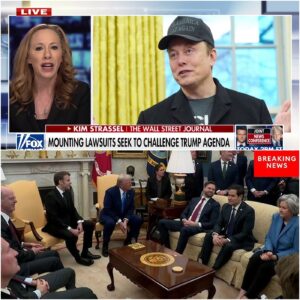Elon Musk has introduced a new policy requiring federal employees to list five things they accomplished each week. If they fail to comply, they risk losing their jobs. The deadline for submitting these reports is midnight. This initiative is part of a broader effort to improve accountability and reduce inefficiency in the government workforce.
The policy has sparked controversy, with supporters arguing that it ensures taxpayer money is being well spent, while critics claim it is an unnecessary burden. Secretary John Duffy has publicly supported Musk’s initiative, emphasizing that such accountability measures are common in the private sector. However, some government employees and unions are pushing back, arguing that this requirement is excessive and unfair.

Democratic Senator Tina Smith strongly criticized Musk’s move, calling it a power play and questioning his authority to impose such measures. She argued that federal employees should be evaluated on their work quality, not forced to justify their roles each week. Other critics compared Musk’s directive to an unrealistic corporate demand, suggesting that a CEO like Tim Cook issuing a similar order to Apple employees would be seen as out of touch with proper management.
Musk, however, defended the initiative, stating that a significant portion of the federal workforce is so inactive that they do not even check their emails. He further claimed that some salaries may be going to non-existent employees or fraudulently collected under false identities. Republicans have largely backed the initiative, citing the high cost of the federal payroll—approximately $271 billion annually—and arguing that basic accountability measures should not be controversial.
In response to the policy, some government employee unions have taken legal action, filing a lawsuit in federal court in San Francisco. They argue that Musk’s directive is intrusive and possibly unconstitutional. The lawsuit highlights growing tensions between Musk’s oversight efforts and traditional government operations.
Meanwhile, Transportation Secretary John Duffy has set an example by publicly listing five accomplishments from his own workweek. His list included terminating the congestion pricing plan in New York City and investigating taxpayer funds spent on high-speed rail. However, not all departments have responded in the same way. Agencies like the FBI and the Department of Defense have opted to conduct their own evaluations rather than follow Musk’s directive outright.
This debate reflects a broader discussion about government efficiency, spending, and oversight. Some believe Musk’s initiative is a much-needed reform, ensuring that federal workers remain accountable for their salaries. Others see it as an overreach by an unelected figure, with concerns about the potential misuse of such measures for political or financial purposes.
Amidst these developments, former President Trump has voiced support for Musk’s policy, stating that it will help identify inefficiencies within the federal workforce. This discussion is unfolding as the government faces increasing scrutiny over spending and debt, with policymakers debating how best to manage public funds responsibly.
As the controversy continues, the future of Musk’s accountability initiative remains uncertain. Whether it leads to greater transparency or sparks further legal battles, it has undeniably ignited a national conversation about government efficiency and waste.
News
Nolwenn Leroy : Les Révélations Poignantes de ses 42 ans sur “l’Amour de sa Vie”
Dans l’univers parfois impitoyable du show-business français, rares sont les artistes qui parviennent à maintenir une frontière étanche entre les…
Julio Iglesias à 81 ans : Entre aveux sincères, secrets de famille et vérité sur sa santé, la légende se livre enfin
Julio Iglesias n’est pas seulement une voix ; il est un mythe vivant, une icône de la romance qui a…
Isabelle Nanty : Le combat secret d’une icône entre la vie et la mort après une hospitalisation critique
Le monde du cinéma français a retenu son souffle. Isabelle Nanty, figure emblématique et solaire de nos écrans, a traversé…
CLASH EXPLOSIF : Louis Boyard et Apolline de Malherbe, le duel qui a embrasé le direct !
L’arène médiatique a tremblé ce matin. Ce qui devait être une interview politique classique s’est transformé en un véritable champ…
Jean-Pierre Foucault en deuil : Les adieux déchirants à Marie-José Tramoni, la seule femme qu’il ait jamais épousée
Le paysage médiatique français est en émoi. Derrière l’image de l’animateur infatigable, toujours prêt à distribuer sourires et bonne humeur…
Sarah Knafo “rhabille” la gauche : le choc des vérités sur le Venezuela !
Le séisme politique : Sarah Knafo face à l’aveuglement idéologique Le paysage médiatique français vient d’être le théâtre d’une déflagration…
End of content
No more pages to load












